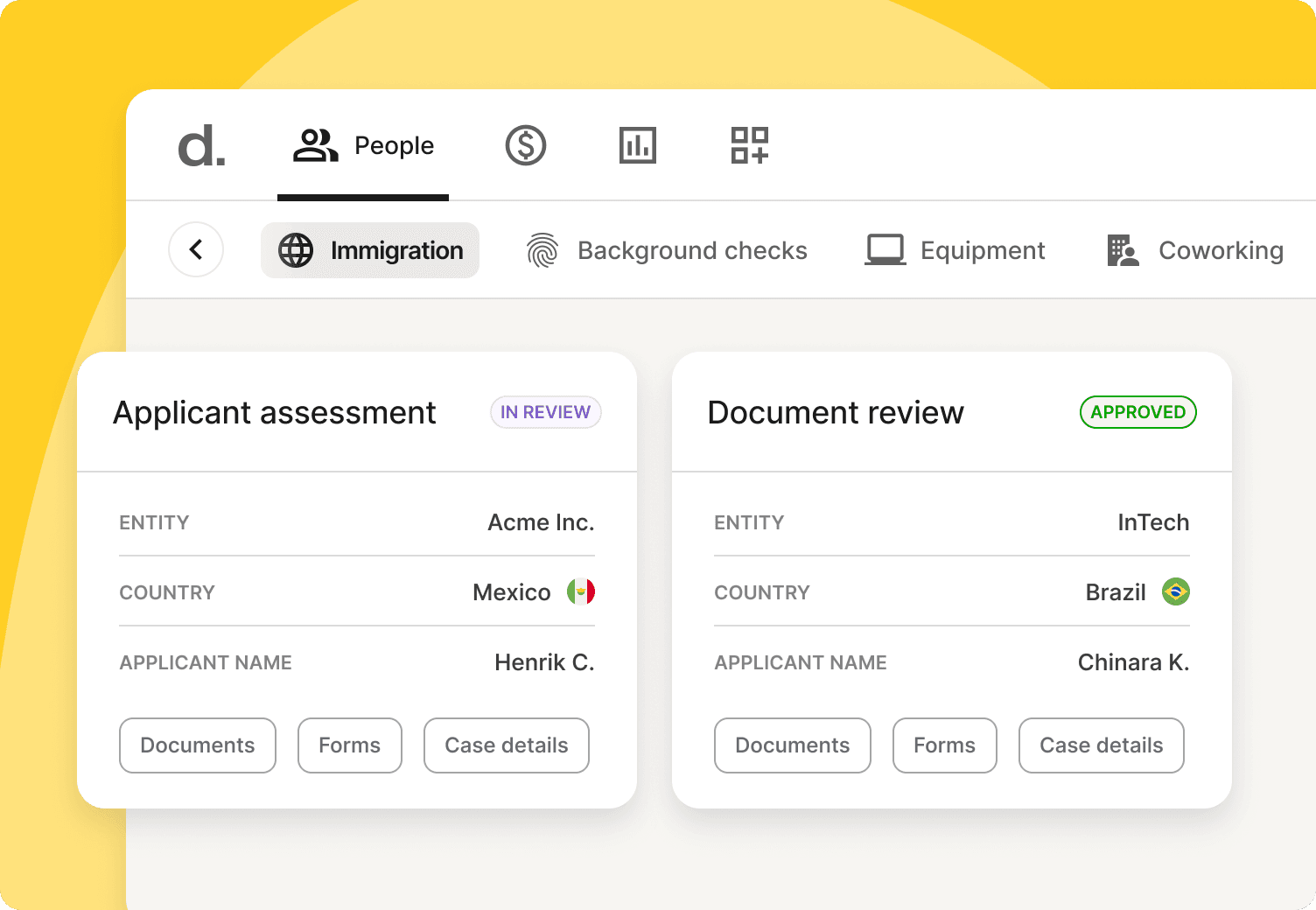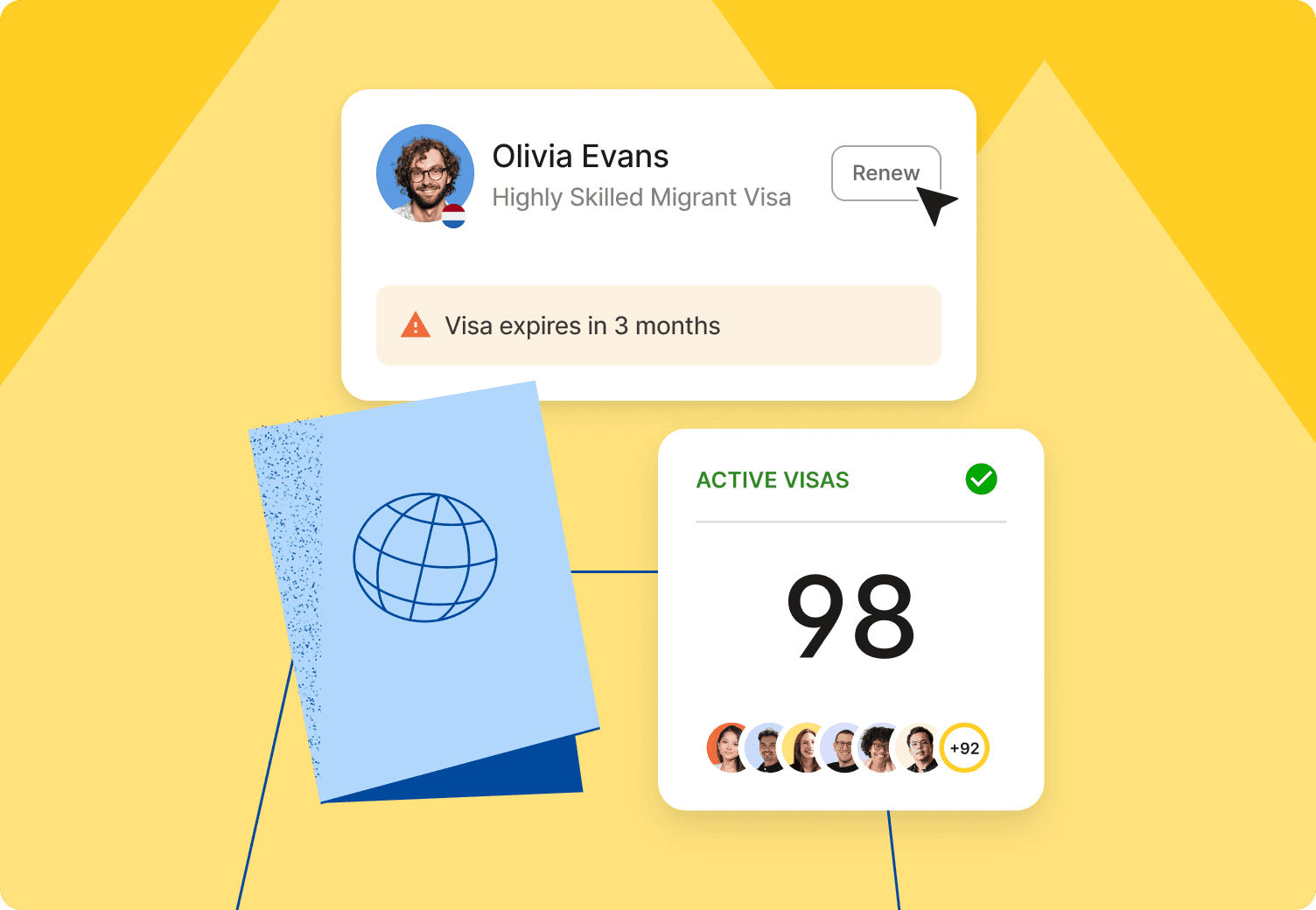Article
12 min read
Hire Non-EU Talent in Germany with the EU Blue Card
Immigration

Author
Jemima Owen-Jones
Last Update
April 08, 2025

Key takeaways
- The EU Blue Card is the best way for employers to secure permanent residency for their skilled non-EU workers in Germany.
- Before the candidate can enter the country, you must help them arrange an embassy appointment. Then you can sponsor them as they register in Germany and apply for the residence permit.
- Deel Immigration simplifies the visa application process by handling all the necessary paperwork, appointments, and background details.
If you’re looking to hire or relocate non-EU workers in Germany, the EU Blue Card is a popular choice. This permit allows the holder to live and work in the country for up to four years with the option for renewal. They may also travel freely within the EU provided they spend the majority of their time in Germany.
Employers considering the EU Blue Card can either manage the application process themselves or partner with an immigration service. Global solutions like Deel can help employers navigate the requirements across borders and overcome any challenges.
Our article outlines what employers need to do if they handle the EU Blue Card application process themselves.
1. Check that your worker requires sponsorship
Before you start the EU Blue Card application process, check whether the candidate already has the right to live and work in Germany. The following groups don’t need a visa or permit:
- EU and EEA citizens
- Immediate family members of German residents
- Displaced ethnic groups with German ancestry
- Recognized refugees and asylum seekers
If your worker is eligible for an EU membership through a family member, it’s worth considering that route. For example, anyone with an Irish parent or grandparent can apply for a passport from Ireland.
2. Ensure their eligibility for an EU Blue Card
Having established that your worker requires sponsorship, check they’re eligible for the EU Blue Card. Germany accepts applicants from the following groups:
- Skilled worker with a degree or vocational training
- Scientists for research or teaching
- IT specialists
- Intra-corporate transfers
- Interns and volunteers
- Seasonal employees
- Self-employed professionals
Candidates can bring their spouse and dependent children with them to Germany using an EU Blue Card. They can sponsor them via a family union visa. If they’re approved, any dependents enjoy the same rights and privileges as your worker.
Unsure about a candidate’s rights or visa eligibility? Deel Immigration lets you instantly check their status via the dashboard. If you feel you need more guidance, you can always book a call with one of our experts.

3. Check the work contract meets requirements
To qualify as a sponsor, your job offer must meet certain conditions. Review the EU Blue Card requirements and the terms of your contract to see if you need to make any amendments.
The employment contract must:
- Define a role that aligns with the candidate’s qualifications and experience
- Cover an employment period of six months or more
- Offer a gross minimum salary of €45,300 ($48,700 USD)
If a job is in high demand—what’s called a ‘bottleneck profession’—there’s a lower minimum salary requirement of €41,041.80 ($44,115). The federal government has a complete list of roles on its website.
Is your tech stack becoming more cumbersome as you expand your operations? Deel enables you to streamline workforce management by consolidating HR, global payroll, and immigration. You can share data about visa applications, benefits, salaries, work contracts, and more seamlessly across our global platform.
Employees can also benefit from a centralized approach. Whether they’re checking the progress of their visa or collecting a paystub, they only need to log into the Deel portal.

4. Book an embassy appointment
Most candidates need an entry visa before they can enter Germany and finalize their EU Blue Card application. The following non-EU citizens are exempt:
- Australia
- Canada
- Israel
- Japan
- New Zealand
- South Korea
- The UK
- The USA
First, have your employees download and complete the long-stay application from the Federal website portal.
Help your worker book an appointment at their nearest German embassy or consulate. You must pay €75 ($83) in fees and bring supporting documents. These vary from case to case but usually include:
- A valid travel document
- The signed and completed entry visa form
- Three biometric photos
- A current resume
- A job description
- A signed work contract
- A signed employer’s declaration
- Proof of health insurance for the duration of their stay
- Copies of validated academic qualifications
- Any professional licenses (these can’t be in process)
Germany has a dedicated system to check the equivalency of any academic qualifications. See whether your workers' certificates are already in the Anabin database. You can apply for a Statement of Comparability if they’re not.
If the embassy approves your visa, your worker will receive it within three to four weeks. They’re now ready to travel to Germany and complete the rest of the EU Blue Card application.
Struggling to manage embassy appointments from afar? Deel Immigration can handle the visa application process by gathering the paperwork, facilitating visa stamping, and providing one-on-one support for your candidates. You can track the application progress via our centralized dashboard to see when you need to take the next step.
5. Register in Germany
Once workers arrive in the country, they should register their address within 15 days. Book an appointment at their nearest German Bürgeramt citizens’ office.
Have the worker bring their ID, entry visa, and a certificate from the leaseholder of their property. You may also need to arrange for a translator if they don’t speak German. The Bürgeramt citizens’ offices don’t typically offer multilingual services.
The appointment should last around 15 minutes and there’s no fee. All your worker has to do is wait while the office completes their registration form and stamps it.
After the appointment, your candidate will receive a German tax ID number. They need this to move to the final stage of the EU Blue Card application and set up a bank account.
Bear in mind that health insurance is mandatory in Germany. You must be careful your worker’s temporary travel insurance doesn’t lapse before they’ve signed up for a plan.
Avoid compliance issues by enrolling them in your company benefits as soon as they register in Germany. Deel can support you by helping you source competitive packages that comply with local regulations.
Use the Deel Benefits Tool to research German requirements for health insurance.

Deel Immigration
6. File the EU Blue Card Application
Now you should be ready to proceed to the final stage of the application process. Be aware that there are long waits for the German EU Blue Card. Monitor your progress closely to ensure you have enough time to finalize the paperwork before the entry visa expires.
Visit the website portal to start an application and attach the following supporting documents for your worker:
- A valid travel document
- A copy of the signed employment contract
- A signed declaration of employment
- Copies of the validated qualifications
- The registration certificate
- A copy of the lease agreement
- Proof of health insurance
- Recent financial records
The application fees for your worker’s first EU Blue Card are €100 ($107), which you must pay via transfer. Renewals cost €93 ($100) for three months or more.
If you secure approval, your worker needs to book an appointment to give biometric data. Have them bring their passport and ID. With this final step completed, they just have to wait six to ten weeks for the official EU Blue Card document.
Would you like more time to focus on welcoming new team members?
Deel Immigration can handle all the paperwork to free up time to focus on orientation and training. We provide a centralized platform where candidates can upload all the supporting documents and any visas they receive. Our team of immigration experts verifies these files and stores them securely on our system.
When it comes time for renewals, Deel notifies you about approaching expiry dates. Then we can help your workers extend their German residency.

Simplify the visa sponsorship process with Deel
Complex visa processes can hinder global workforce management and expansion plans. Deel can help you keep plans on track by managing all the paperwork, checks, and unforeseen challenges.
When you partner with Deel, your team can:
- Confirm visa eligibility before you hire or relocate workers
- Conduct thorough background checks
- Oversee all immigration activities via the centralized Deel dashboard
- Track visa expiration dates and get reminded about renewals
- Generate contracts that comply with visa requirements and local labor laws
- Provide equipment and flexible workspaces for global teams
- Manage international payroll and benefits
- Delegate visa sponsorship to Deel EOR for a completely hands-off experience
Sound like the ideal solution for your global mobility challenges? Discover our immigration services or book a call to get your questions answered.
Disclaimer: Our article isn’t a substitute for legal advice. Please consult with a professional service before taking any action.
More resources

About the author
Jemima is a nomadic writer, journalist, and digital marketer with a decade of experience crafting compelling B2B content for a global audience. She is a strong advocate for equal opportunities and is dedicated to shaping the future of work. At Deel, she specializes in thought-leadership content covering global mobility, cross-border compliance, and workplace culture topics.
















